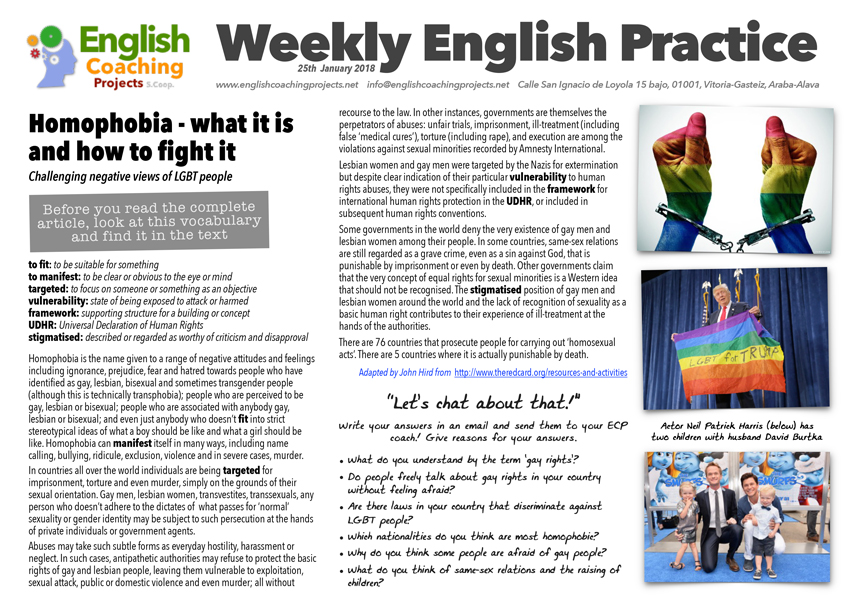Click on the image to download the pdf
Challenging negative views of LGBT people
Vocabulary. Read and check you understand this before you read and listen to the article:
to fit: to be suitable for something
to manifest: to be clear or obvious to the eye or mind
targeted: to focus on someone or something as an objective
vulnerability: state of being exposed to attack or harmed
framework: supporting structure for a building or concept
UDHR: Universal Declaration of Human Rights
stigmatised: described or regarded as worthy of criticism and disapproval
Homophobia is the name given to a range of negative attitudes and feelings including ignorance, prejudice, fear and hatred towards people who have identified as gay, lesbian, bisexual and sometimes transgender people (although this is technically transphobia); people who are perceived to be gay, lesbian or bisexual; people who are associated with anybody gay, lesbian or bisexual; and even just anybody who doesn’t fit into strict stereotypical ideas of what a boy should be like and what a girl should be like. Homophobia can manifest itself in many ways, including name calling, bullying, ridicule, exclusion, violence and in severe cases, murder.
In countries all over the world individuals are being targeted for imprisonment, torture and even murder, simply on the grounds of their sexual orientation. Gay men, lesbian women, transvestites, transsexuals, any person who doesn’t adhere to the dictates of what passes for ‘normal’ sexuality or gender identity may be subject to such persecution at the hands of private individuals or government agents.
Abuses may take such subtle forms as everyday hostility, harassment or neglect. In such cases, antipathetic authorities may refuse to protect the basic rights of gay and lesbian people, leaving them vulnerable to exploitation, sexual attack, public or domestic violence and even murder; all without recourse to the law. In other instances, governments are themselves the perpetrators of abuses: unfair trials, imprisonment, ill-treatment (including false ‘medical cures’), torture (including rape), and execution are among the violations against sexual minorities recorded by Amnesty International.
Lesbian women and gay men were targeted by the Nazis for extermination but despite clear indication of their particular vulnerability to human rights abuses, they were not specifically included in the framework for international human rights protection in the UDHR, or included in subsequent human rights conventions.
Some governments in the world deny the very existence of gay men and lesbian women among their people. In some countries, same-sex relations are still regarded as a grave crime, even as a sin against God, that is punishable by imprisonment or even by death. Other governments claim that the very concept of equal rights for sexual minorities is a Western idea that should not be recognised. The stigmatised position of gay men and lesbian women around the world and the lack of recognition of sexuality as a basic human right contributes to their experience of ill-treatment at the hands of the authorities.
There are 76 countries that prosecute people for carrying out ‘homosexual acts’. There are 5 countries where it is actually punishable by death.
“Let’s chat about that!”
Write your answers in an email and send them to your ECP coach! Give reasons for your answers.
- What do you understand by the term ‘gay rights’?
- Do people freely talk about gay rights in your country without feeling afraid?
- Are there laws in your country that discriminate against LGBT people?
- Which nationalities do you think are most homophobic?
- Why do you think some people are afraid of gay people?
- What do you think of same-sex relations and the raising of children?
Adapted by John Hird from http://www.theredcard.org/resources-and-activities


